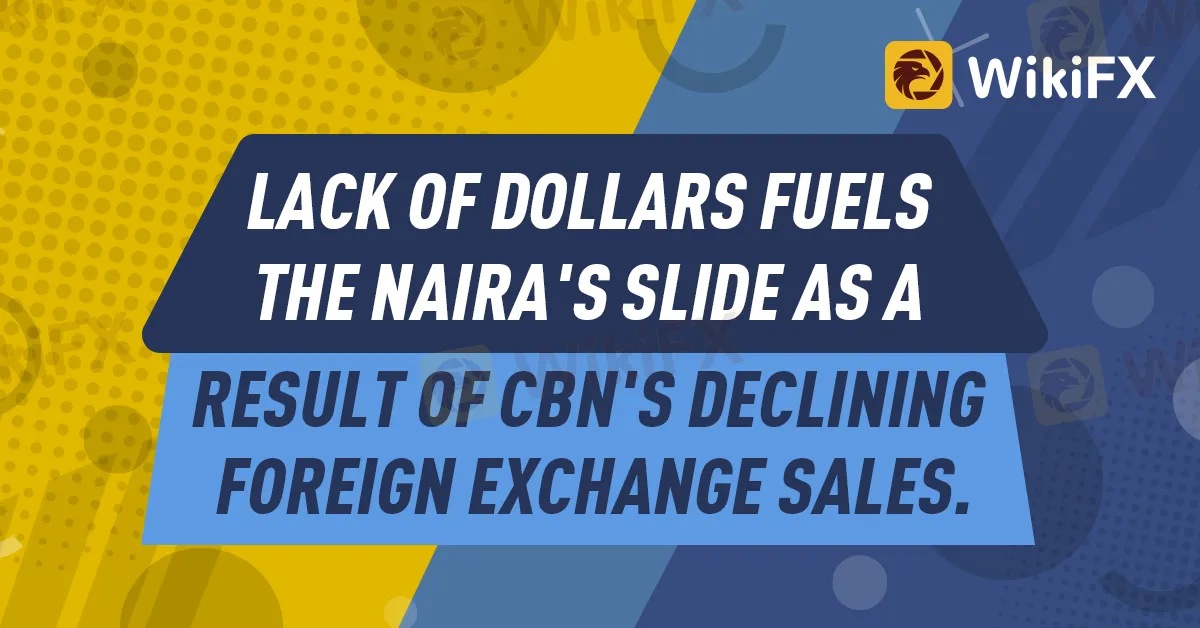Abstract:The Central Bank of Nigeria's (CBN) decrease in foreign exchange sales to authorized dealers in recent months has fueled dollar scarcity and naira devaluation on global FX markets.

The Central Bank of Nigeria's (CBN) decrease in foreign exchange sales to authorized dealers in recent months has fueled dollar scarcity and naira devaluation on global FX markets.
In recent weeks, the naira has been rapidly falling, reaching a record low on Wednesday in the parallel market of N843 per dollar.
According to data from the FMDQ, the naira lost 0.68 percent of its value in the Investors and Exporters (I&E) forex window on Tuesday, when the dollar was quoted at N446.00 vs the previous close of N443.00 on Monday.
According to CBN data, FX sales to authorized dealers fell by 1.02 percent quarterly in the second quarter of 2022 compared to the first quarter, totaling $4.81 billion instead of $4.86 billion.
The change came as significant sources of dollar inflows started to dwindle. Oil revenue, non-oil exports, foreign direct investment, foreign portfolio investment, and remittances from abroad are all sources of dollar inflows.
According to a monthly report by Afrinvest Securities Limited, the oil market experienced a respite from monthly losses since June after achieving a 9.0 percent rise to $92.81 per barrel in October 2022.
As of October 28, 2022, Nigeria's foreign exchange reserves were down by 2.1 percent to $37.4 billion, continuing a decreasing trend.
Analysts at Afrinvest stated that this “reiterates Nigeria's vulnerability in expanding its reserves from oil price accretion.”
Total net inflows to the I&E FX market decreased from $86.7 million in September 2022 to $46.9 million in October.
In contrast, non-bank corporates saw net inflows of $91.1 million, with the CBN receiving $39.9 million, other corporates receiving $9.5 million, and foreign direct investment receiving $3.2 million, according to the report. The market saw net outflows of $83.1 million from exporters, $10.6 million from foreign portfolio investments, and $3.1 million from individuals.
According to CBN's quarterly report, sales at the I&E window and interventions for small and medium-sized businesses fell by 8.6% and 41.3%, respectively, to $0.34 billion and $0.83 billion from the previous quarter.
However, as compared to the previous quarter's figures, interbank/invisibles and retail secondary market intervention sales windows saw increases of 5.3% and 14.7%, respectively, to $0.48 billion and $2.05 billion.
The CBN this week announced plans to replace the existing N200, N500, and N1,000 notes with new banknotes starting on December 15, 2022.
The CBN's curtailed supply has resulted in dollar shortage and speculative activity, which has further devalued the Naira. The redesign of the naira, in my opinion, is unrelated. FX scarcity is partly a result of the decline in oil revenues, according to an investment banker in Lagos.
According to Taiwo Oyedele, head of tax and corporate consulting services at PwC, the CBN is undoubtedly only partially able to accommodate the increased demand for foreign currency, some of which is speculative or illegal.
He claims that the recent announcement of the redesign of the naira has merely exacerbated the already dire circumstances, as the naira has continued to decline sharply against the major international currencies in both the official and black markets.
Unfortunately, a lot of importers obtain the majority of their foreign exchange requirements via the black market, including manufacturers. In the ensuing months, this will exert upward pressure on inflation, according to him.
Aminu Gwadabe, national president of the Association of Bureau De Change of Nigeria, responded to the situation by stating that there has been a persistent lack of liquidity in the crucial retail sector of the foreign currency market even before the introduction of the new naira redesign strategy.
He claims that legacy factors such as diminishing buffers, debt service obligations, external balance of payment deficits, lower earnings, and illegal economic practices like currency hoarding, currency substitution, insecurity, and election spending are the root causes. These factors have continued to put pressure on the weak local currency.
“The naira redesign is an orthodox policy aimed at managing the twin concerns of inflation, exchange rate volatility that causes our local currency to lose value, and persistent insecurity in the system,” he stated. Therefore, it is incorrect to attribute our ongoing currency attrition to the policy.
I consider the shift in the exchange rate to be fictitious, speculative, and not a reliable indicator of when the bubble will burst. I think it will only last a short while because of the CBN's capacity and resilience, together with that of the security agencies, and we will eventually learn the system's actual clearance market rate.










